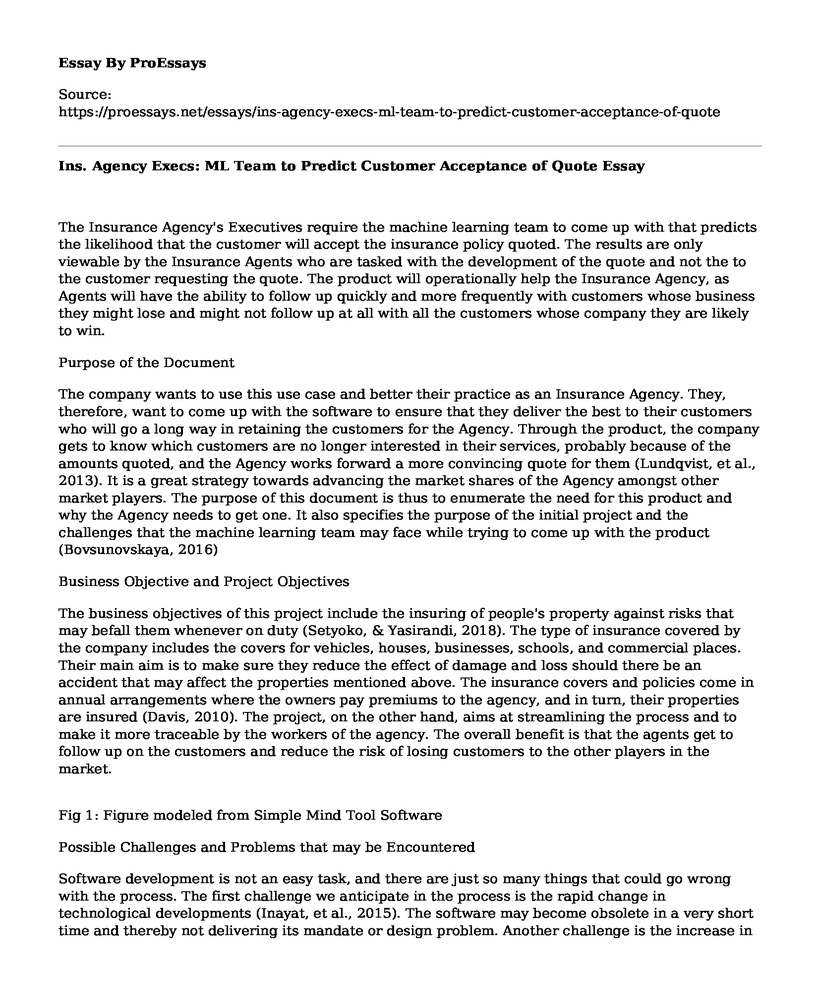The Insurance Agency's Executives require the machine learning team to come up with that predicts the likelihood that the customer will accept the insurance policy quoted. The results are only viewable by the Insurance Agents who are tasked with the development of the quote and not the to the customer requesting the quote. The product will operationally help the Insurance Agency, as Agents will have the ability to follow up quickly and more frequently with customers whose business they might lose and might not follow up at all with all the customers whose company they are likely to win.
Purpose of the Document
The company wants to use this use case and better their practice as an Insurance Agency. They, therefore, want to come up with the software to ensure that they deliver the best to their customers who will go a long way in retaining the customers for the Agency. Through the product, the company gets to know which customers are no longer interested in their services, probably because of the amounts quoted, and the Agency works forward a more convincing quote for them (Lundqvist, et al., 2013). It is a great strategy towards advancing the market shares of the Agency amongst other market players. The purpose of this document is thus to enumerate the need for this product and why the Agency needs to get one. It also specifies the purpose of the initial project and the challenges that the machine learning team may face while trying to come up with the product (Bovsunovskaya, 2016)
Business Objective and Project Objectives
The business objectives of this project include the insuring of people's property against risks that may befall them whenever on duty (Setyoko, & Yasirandi, 2018). The type of insurance covered by the company includes the covers for vehicles, houses, businesses, schools, and commercial places. Their main aim is to make sure they reduce the effect of damage and loss should there be an accident that may affect the properties mentioned above. The insurance covers and policies come in annual arrangements where the owners pay premiums to the agency, and in turn, their properties are insured (Davis, 2010). The project, on the other hand, aims at streamlining the process and to make it more traceable by the workers of the agency. The overall benefit is that the agents get to follow up on the customers and reduce the risk of losing customers to the other players in the market.
Fig 1: Figure modeled from Simple Mind Tool Software
Possible Challenges and Problems that may be Encountered
Software development is not an easy task, and there are just so many things that could go wrong with the process. The first challenge we anticipate in the process is the rapid change in technological developments (Inayat, et al., 2015). The software may become obsolete in a very short time and thereby not delivering its mandate or design problem. Another challenge is the increase in customer demands. The customer may decide that they not only want a software that gives them the quoted insurance policy but also explains to them why they said policy is the best and what they used to achieve the figures mentioned (De Lemos, et al., 2013).
Another problem may be time constraints required to deliver the software putting the machine learning team in pressure. There may also be challenges with the resources allocated for the work in scenarios where the materials are not enough. Finally, there could also be problems related to the testing of the software (Bacchelli & Bird, 2013). Nevertheless, anticipating these problems and planning for them may reduce the chances of them happening, and hence the work is delivered to the desired qualities.
Fig 2: designed from MindMap Software
References
Bacchelli, A., & Bird, C. (2013, May). Expectations, outcomes, and challenges of modern code review. In 2013 35th International Conference on Software Engineering (ICSE) (pp. 712-721). IEEE.
Bovsunovskaya, M. (2016). Document support of cost management in underground construction projects. Procedia Engineering, 165, 960-964.
Davis, B. (2010). The feasibility of crop insurance agency acquisitions (Doctoral dissertation, Kansas State University).
De Lemos, R., Giese, H., Muller, H. A., Shaw, M., Andersson, J., Litoiu, M., ... & Weyns, D. (2013). Software engineering for self-adaptive systems: A second research roadmap. In Software Engineering for Self-Adaptive Systems II (pp. 1-32). Springer, Berlin, Heidelberg.
Inayat, I., Salim, S. S., Marczak, S., Daneva, M., & Shamshirband, S. (2015). A systematic literature review on agile requirements engineering practices and challenges. Computers in human behavior, 51, 915-929.
Lundqvist, A., Johansson, N., & Yildiz, S. (2013). Intranet for project and document management.
Setyoko, Y. A., & Yasirandi, R. (2018, May). Security Protection Profile on Smart Card System Using ISO 15408 Case Study: Indonesia Health Insurance Agency. In 2018 6th International Conference on Information and Communication Technology (ICoICT) (pp. 425-428). IEEE.
Cite this page
Ins. Agency Execs: ML Team to Predict Customer Acceptance of Quote. (2023, May 30). Retrieved from https://proessays.net/essays/ins-agency-execs-ml-team-to-predict-customer-acceptance-of-quote
If you are the original author of this essay and no longer wish to have it published on the ProEssays website, please click below to request its removal:
- The Stock Performance of AmerisourceBergen Corporation Case Study Example
- IQ Intelligence Essay Example
- Operating Budget Estimates - Essay Sample
- Research Paper on Corporate Tax: Source of Income for Governments Since Time Immemorial
- Research Paper on The Banking Industry's Revolutionary History in the U.S.
- Essay on Healthy Eating on a Budget: Peanut Butter, Unsalted Pepitas & Flax Seeds
- Essay Example on Comparing Returns of Private Equity and Investment Firms







